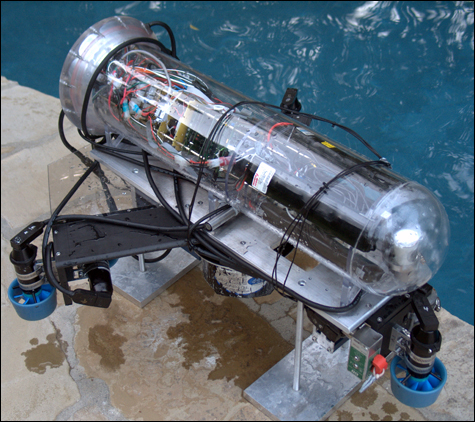
EXPLORER An autonomous underwater vehicle. |
The future is about more than the singularity, of course. It's about robots, lab-grown organs, and watching hopelessly as the Chinese pilfer our military secrets.
URI's "Are You Ready For the Future?" colloquium will touch on all of these topics and more in a series of Tuesday night talks over the next couple of months.
>> READ: "Dark side of the future: URI explores 'the Singularity'" by David Scharfenberg <<
The lectures, free and open to the public, begin at 7:30 pm in Edwards Auditorium on the Kingston campus.
Too lazy to strap on your jetpack and fly south for some futurethink? Stream the talks live at uri.edu/hc instead, or catch them a few days later on the university's YouTube channel — youtube.com/user/universityofri.
Below, a schedule of the remaining lectures and Q&As with three of the upcoming speakers, conducted by email.
THE SCHEDULE
• October 4 — Anthony Atala, director of Wake Forest's Institute for Regenerative Medicine, on making new organs
• October 11 — Bioengineer Jim Collins on synthetic biology
• October 18 — URI professor Jason Dwyer on trends in nanotechnology
• October 25 — URI professor Chris Roman, Monterey Bay Aquarium Research Institute chief technologist James Bellingham, and National Oceanic and Atmospheric Administration research meteorologist Joseph Cione on robotics use in the ocean
• November 1 — Biological engineer and brain and cognitive scientist Ed Boyden on enhancing the brain — past, present, and future
• November 8 — Cognitive scientist Deb Roy and media researcher Johanna Blakley on social media
• November 15 — Cybersecurity expert Richard Clarke on cyberwarfare
• November 29 — Laurie Zoloth, director of Northwestern's Center for Bioethics, Science and Society, on ethics and genetics

BUILDING BLOCK A stem cell. |
GROWING ORGANSDr. Anthony Atala heads up Wake Forest's Institute for Regenerative Medicine, which engineered the world's first laboratory-grown organs implanted in humans.
YOUR INSTITUTE HAS ALREADY GROWN NEW BLADDERS OUT OF PATIENTS' CELLS AND SUCCESSFULLY IMPLANTED THEM. NOW YOU'RE WORKING ON A PROJECT THAT WOULD REPAIR SOLDIERS' BURNED TISSUE OR EVEN REGROW THEIR LIMBS. HOW WOULD THIS AFFECT THE ETHICS OF WAR? WILL WE HESITATE TO FIGHT IF WE KNOW WE CAN FIX THE DAMAGE? The ethics of war is not my area of expertise, so I cannot comment on that, but I can say that throughout history war has driven the need for medical innovation. Today, due to improvements in care, thousands of warriors are surviving severe injuries, but may face a lifetime of disability. Regenerative medicine offers the potential to improve the quality of life for the men and women who serve our country — whether it's a new way to treat severe burns, a new source to replace damaged muscle, or treatments to promote healing without scarring.
YOU'VE SAID YOU'D LIKE TO DEVELOP A FULL COMPLIMENT OF OFF-THE-SHELF TISSUES AND ORGANS THAT COULD SAVE LIVES. HOW FAR AWAY ARE WE FROM THAT REALITY? Some tissues and organs — such as skin, cartilage, bladders, urine tubes, and trachea — are already in patients. The lessons learned from these projects are now being applied in efforts to engineer organs and develop cell therapies for more than 30 different areas of the body. As we continue to meet scientific challenges, additional treatments will become available. Because science is a field with unexpected breakthroughs, as well as unexpected setbacks, it is impossible to predict a timeframe for developing a full complement of treatments.